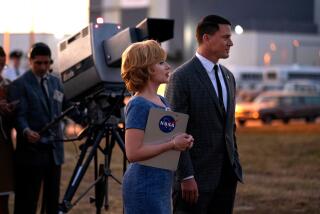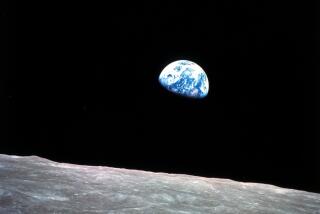On the Moon, We Came Full Circle
Most people who are old enough can remember where they were on July 20, 1969, when Neil Armstrong took his first step on the moon’s surface. Most of us were sitting in front of a TV set, speechless with excitement, savoring the historical moment as Armstrong’s first resonant words were uttered and the screen began flashing the incredible message
LIVE FROM THE MOON.
What did it all mean for us, for our country? Within minutes the TV commentators weighed in. Some spoke piously of Columbus and the Wright brothers. Others were unimpressed, and linked the voyage to our presence in Vietnam, asking when we would stop planting the flag in alien turf.
My favorite response was that of a man who had been born into slavery more than a century earlier. He told Walter Cronkite that the moon story flatly couldn’t be true. Cronkite explained that, indeed, many people believed the whole thing was a hoax concocted in a studio.
That former slave’s disbelief has always struck me as the purest tribute to the moon landing’s magical achievement. For the Apollo mission seemed in 1969 to radically weaken a world view that had governed mankind since the beginning of human experience. It seemed to explode, for better or worse, a mythology attributing superhuman and sacred powers to the cosmos.
The myth had been given form by the Romans as the virginal moon goddess Diana, who represented a forever inaccessible and immaculate domain off limits to mere mortals. The first violation of this gatekeeper figure would be fatal. “To set foot on the moon even once,” wrote poet Jack Anderson, “is to corrupt it utterly.”
Yet this was a marriage of Diana and Apollo, the Greeks’ god of light, enlightenment and prophecy, the Romans’ god of healing.
As the culminating event in “the conquest of the air” pursued by engineers since Leonardo da Vinci’s experiments with aeronautical design, the moon landing extended the frontier mythology that had always nurtured our nation. Suddenly space was ours to possess by right of occupation, by manifest destiny. Whether we dreamed of filling space with weapons, or with rockets (manned or otherwise) to the far planets and beyond the solar system, the exhilarating prospect remained of a universe now within our technological grasp, no longer sundered from us by an impassable distance that confined us to our native home.
And so, argued many of our wisest, the archaic breach between heaven and Earth had been healed by Apollo 11. Wrote Joseph Campbell, the great scholar of myth, “The old dichotomy between spirit and matter, God and man, is finished.” Astronauts would now go forth and extend the sacred history of Homo faber, Man the Maker, by colonizing every foreign body that had formerly belonged to the realm of the divine. The species would achieve a new stage of evolution. No wonder that millions of people were frightened into denial by the apocalyptic fact of the lunar landing.
Twenty years later we recognize the hubris of some of those first responses. Traditional religious beliefs did not succumb to space consciousness; perhaps they were even strengthened by it. Though the glamour of space did kill off the frontier mythology of our Wild West, it has paradoxically turned our wondering gaze back on our own familiar world. For space exploration since 1969 has revealed to us that so far as complex life goes, we are it. Planet 3 may well be the only green paradise in a galaxy of dead stone, and we are charged to maintain it as a condition of any further outreach into the heavens.
The new mythology initiated by Apollo 11, then, turned out to resemble the oldest, the reverence for Gaia the primal Earth Mother. Nobody has said it better than T. S. Eliot:
“We shall not cease from exploration / And the end of all our exploring / Will be to arrive where we started / And know the place for the first time.”
More to Read
Sign up for Essential California
The most important California stories and recommendations in your inbox every morning.
You may occasionally receive promotional content from the Los Angeles Times.










